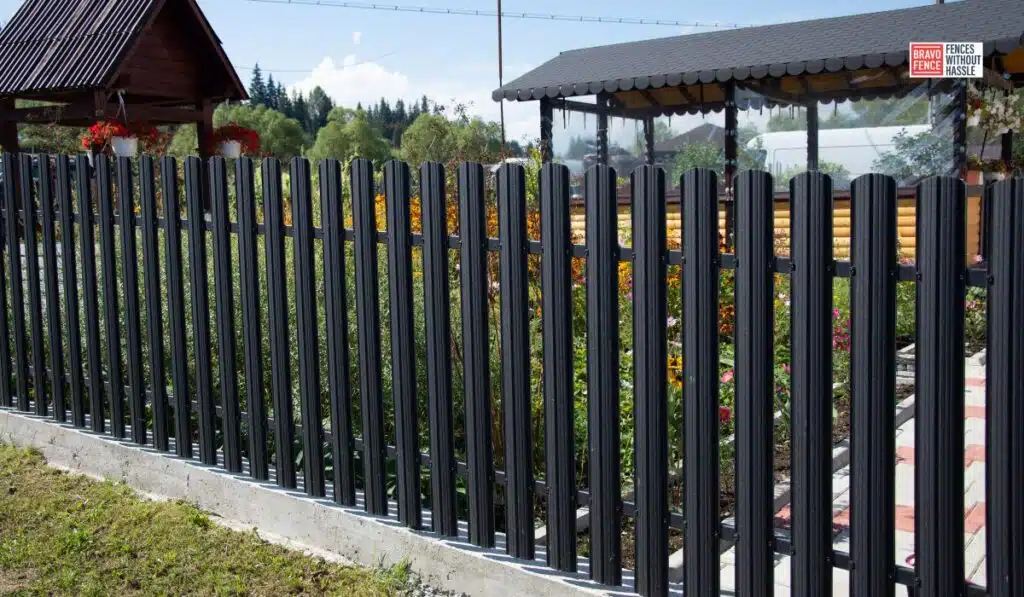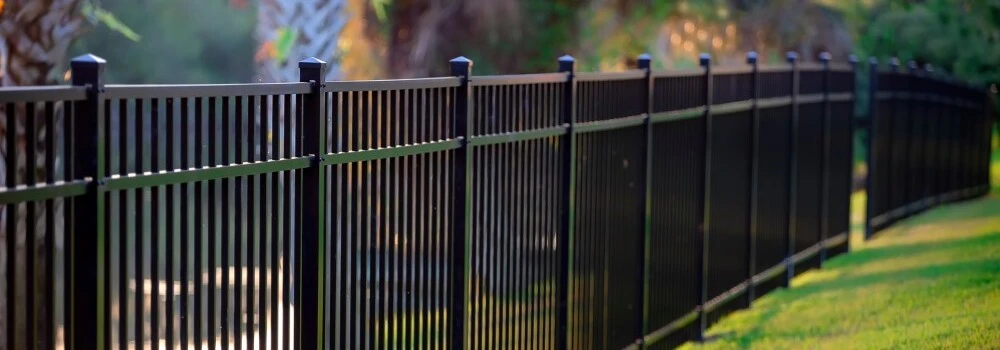
Comprehensive Guide: Installing Your Aluminum Fence with Strength
Few projects in home improvement boast both aesthetic appeal and practical functionality, quite like installing an aluminum fence.
Whether it’s to enhance security, define boundaries, or add a touch of elegance to your property, installing an aluminum fence stands tall as a versatile and durable option.
However, before embarking on this endeavor, it’s essential to arm yourself with knowledge and preparation.
In this comprehensive guide, we’ll delve into the details of installing an aluminum fence, ensuring that your project is not only successful but also a testament to craftsmanship.
Understanding the Appeal of Aluminum Fencing
Aluminum fencing has steadily risen in popularity, and for good reason.
Its lightweight yet robust construction offers a perfect balance of strength and versatility, making it an excellent choice for installing an aluminum fence.
Unlike its wrought iron counterparts, aluminum fences are resistant to rust and corrosion, making them ideal for enduring various weather conditions without sacrificing durability.
Additionally, their sleek and modern appearance effortlessly complements a wide array of architectural styles, making them a favored choice among homeowners and property developers alike.
Pre-Installation Preparations
Before diving headfirst into the installing aluminum fence process, meticulous planning is vital.
Begin by surveying your property lines to ensure that the fence will be installed within your legal boundaries.
Consulting with local authorities or homeowner associations regarding regulations and permits is also advisable, as compliance with zoning laws and building codes is paramount.
Next, gather all the necessary tools and materials for the project.
This typically includes aluminum fence panels, posts, gates, concrete mix, screws, and a variety of hand and power tools.
Ensuring that you have everything on hand will streamline the installation process and minimize potential delays.
Step-by-Step Installation Guide
Marking and Layout:
Start by marking the desired layout of your fence using stakes and string.

This serves as a visual guide for where the fence will be installed, allowing for adjustments as needed.
Digging Post Holes:
With the layout established, proceed to dig post holes at regular intervals along the fence line.
The depth and diameter of these holes will depend on the specific requirements of your fence, typically ranging from 18 to 24 inches deep and 6 to 8 inches in diameter.
Installing End and Corner Posts:
Set the end and corner posts first, as these serve as anchor points for the rest of the fence.
Use a level to ensure that the posts are plumb and upright before filling the holes with concrete for stability.
Inserting Fence Panels:
Once the concrete has set, it’s time to install the fence panels. Slide each panel into the pre-routed holes on the posts, ensuring that they are securely in place.
Attaching Rails and Caps:
With the panels in position, attach the horizontal rails to the posts using screws or brackets.
This provides additional stability and support to the fence structure.
Remember to cap the posts for a polished finish and added weather protection.
Installing Gates:
If your fence includes gates, now is the time to install them.
Follow the manufacturer’s instructions carefully to ensure proper alignment and functionality.
Final Touches:
Once all the components are in place, take a step back to admire your handiwork.
Make any necessary adjustments to ensure that the fence is level and cohesive in appearance.
Benefits of Professional Installation
Expertise and Experience:
Professional installers have the knowledge and experience to handle installing aluminum fence projects of various sizes and complexities.
They are familiar with the best practices and techniques to ensure a high-quality installation that meets industry standards.
Time and Efficiency:
Hiring professionals can save you time and effort.
They have the necessary tools, equipment, and workforce to complete the aluminum fence project efficiently, often in a fraction of the time it would take for a DIY approach.
Proper Preparation:
Professional installers will conduct a thorough assessment of your property, including soil conditions, terrain, and any potential obstacles.
This ensures that the installation process is properly planned and executed, minimizing the risk of errors or complications.
Warranty and Guarantee:
Reputable installation companies often provide warranties or guarantees on their artistry.
This offers peace of mind, knowing that if any issues arise post-installation, they will be addressed promptly and at no additional cost to you.
Compliance and Regulations:
Professional installers are well-versed in local building codes, zoning regulations, and permit requirements.
They will ensure that your aluminum fence is installed in compliance with all applicable laws, reducing the risk of fines or legal complications down the line.
Safety:
Installing aluminum fences can involve heavy materials and machinery, as well as working at heights.

Professional installers are trained in safety protocols and take necessary precautions to prevent accidents or injuries during the installation process.
Aesthetics and Precision:
Professional installers have an eye for detail and take pride in their artistry.
They will ensure that your aluminum fence is installed with precision and attention to detail, resulting in a visually appealing and cohesive final product.
Conclusion
In conclusion, installing an aluminum fence is not just about putting up a barrier; it’s about enhancing your property’s aesthetics, security, and value.
With careful planning, proper execution, and attention to detail, your aluminum fence will not only stand as a physical boundary but as a symbol of craftsmanship and pride.
So, embrace the challenge and let your property shine with the enduring strength and elegance of aluminum fencing.
Remember, each step in installing an aluminum fence is an opportunity to elevate your property’s curb appeal and functionality, creating a space that reflects your style and enhances your lifestyle.
FAQ
What are the benefits of installing an aluminum fence over other materials?
Aluminum fences offer several advantages, including durability, low maintenance, resistance to rust and corrosion, and a wide range of styles and colors to choose from. Additionally, they provide a sleek and modern appearance that complements various architectural styles.
How long does it take to install an aluminum fence?
The time required to install an aluminum fence can vary depending on factors such as the size of the area, the complexity of the terrain, and the skill level of the installer. Generally, a basic installation can take anywhere from a few days to a week to complete.
Do I need to obtain permits before installing an aluminum fence?
Permit requirements vary depending on your location and local regulations. In some areas, installing a fence may require a permit, while in others, it may not. It’s essential to check with your local building department or homeowner association to determine if permits are needed before proceeding with the installation.
Can I install an aluminum fence myself, or should I hire a professional?
While it’s possible to install an aluminum fence yourself, hiring a professional installer is often recommended, especially for larger or more complex projects. Professional installers have the experience, tools, and expertise necessary to ensure that the fence is installed correctly and efficiently.
What maintenance is required for an aluminum fence?
One of the primary benefits of aluminum fencing is its low-maintenance nature. Unlike wood fences, aluminum fences do not require staining or painting. Periodic cleaning with soap and water is usually sufficient to keep the fence looking its best. Additionally, inspecting for any loose or damaged components and addressing them promptly can help prolong the life of the wall.
Can an aluminum fence withstand harsh weather conditions?
Yes, aluminum fences are designed to withstand various weather conditions, including rain, snow, and extreme temperatures. They are resistant to rust and corrosion, making them ideal for outdoor use in virtually any climate.
Are aluminum fences suitable for security purposes?
While aluminum fences may not offer the same level of security as solid barriers like brick or concrete walls, they can still serve as effective deterrents to intruders. Adding features such as pointed finials or decorative spear tops can enhance security while maintaining the fence’s aesthetic appeal.
Can aluminum fences be customized to fit specific needs or preferences?
Yes, aluminum fences can be customized in terms of height, style, color, and accessories to suit individual preferences and requirements. Whether you’re looking for a traditional picket fence or a contemporary design with ornamental details, there are numerous options available to personalize your aluminum fence.
What is the lifespan of an aluminum fence?
Aluminum fences are known for their longevity and can last for several decades with proper care and maintenance. Unlike wood fences, which are susceptible to rotting and warping, aluminum fences are resistant to deterioration, ensuring years of reliable performance and aesthetic appeal.
Can I install a gate in my aluminum fence?
Yes, aluminum fences can accommodate gates of various sizes and styles to provide convenient access to your property. Whether you need a single or double gate, swing, or slide mechanism, there are options available to complement your fence and meet your specific needs.
Tags: Complete Guide to Aluminum Fence Installation Guide, Complete Guide to Aluminum Fence Installation Process, Complete Guide to Aluminum Fence Installation Tips, Complete Guide to How To Install An Aluminum Fence, Complete Guide to Installing Aluminum Fence Panels, Everything You Need to Know About Commercial Aluminum Fence Installation, Explore Helpful Resources on Diy Aluminum Fence Installation, Explore Helpful Resources on Installing Aluminum Fence Posts, Explore Helpful Resources on Professional Aluminum Fence Installers, Top Ideas and Insights About Aluminum Fence Installation Cost, Top Ideas and Insights About Aluminum Gate Installation, Top Ideas and Insights About Residential Aluminum Fence Installation

